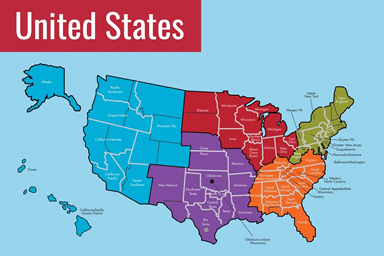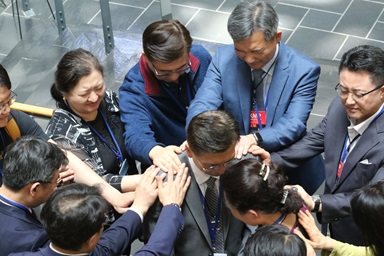2019년 총회 결정에 의한 전체적인 파급 효과는 여전히 불분명하지만, 그중 일부는 명확해졌다.
교단의 최고 입법기구인 총회가 2월 26일 폐회된 후 다음과 같은 일들이 일어났다.
• 연합감리교회를 떠날 가능성을 제기했던 한 그룹은 즉각적인 계획이 없다는 발표를 했다.
• 총회 윤리위원회는 대의원의 뇌물 수수 혐의에 대한 증거를 발견하지 못했다고 발표했다.
• 교단 최고법원인 사법위원회는 이번 총회에서 새로 승인된 입법안들이 교단 헌법에 부합하는지 결정하는 4월 회의에서 심사할 요청서의 제출 마감일을 공개했다.
• 감독들과 교회 지도자들은 총회에서 결정한 내용과 여전히 성소수자들과의 사역 방법 및 성서 해석의 견해차를 가지고 있는 다국적 교단인 연합감리교회 앞에 놓인 문제들에 관해 설명하기 시작했다.
많은 교회 지도자들은 2년 이상이 걸린 준비 과정과 총회에서 벌인 가시 돋친 논쟁으로 인해 지치고 상한 마음을 치유에 대해 말했다.
"우리의 관심은 교회의 치유에 있다. 기관이나 관료주의로서의 교회가 아닌, 우리가 서로에게 더 잘할 수 있는 공존할 수 있는 교회가 되도록 치유하자는 것이고, 성소수자들이 느끼는 커다란 아픔을 이해하자는 것이다."라고 총감독회 회장인 케네스 카터 감독은 말했다.
카터 감독은 3월 1일 플로리다 연회를 위한 웹 세미나에서 연설했다. 그는 총회의 결과에 관해 자신의 연회 구성원들과 온라인 또는 직접 대화를 통해 소통하는 감독들 가운데 한 사람이다.
총회는 438 대 384로 동성 결혼과 "동성애 관계에 있다고 공언한" 성소수자의 안수에 대한 교단의 금지와 처벌을 강화하는 전통주의 플랜을 통과시켰다.
대의원들은 연회 3분의 2 찬성과 일정한 비용을 지급하면, 교회 재산을 가지고 교단을 탈퇴할 수 있는 입법안을 채택했다.
웨슬레언약협회(WCA)는 전통주의 플랜과 수정된 전통주의 플랜 그리고 교단 탈퇴에 관한 입법을 지지했다. 총회가 열리기 전, 이 단체의 리더들은 새로운 교단을 결성하기 위해 4월 창립총회를 소집할 것을 고려하고 있다고 말했었다.
이 단체는 특히 동성 결혼에 관한 판단을 개체 교회에 맡기고, 성소수자에 대한 안수는 각 연회에 맡기자는 총감독회가 추천한 하나의 교회 플랜을 반대했다.
전통주의 플랜이 통과되자, WCA 리더들은 교단을 떠나기로 한 비상 계획과 4월 모임을 취소했다.
WCA는 성 윤리에 관한 교회의 가르침을 재인준해준 총회에 감사하며, 연합감리교회의 효과적 선교를 위해 매진할 것이라고 말했다.
이 단체는 2월 28일 성명을 통해 "우리는 교단의 장애와 비효율성을 가져오는 문제를 해결하기 위한 노력을 멈추지 않을 것이다. 다른 연합감리교인들과 협력하여 2020년 차기 총회에서 교단의 은혜로운 탈퇴에 대한 입법안을 포함한 논쟁을 마무리하려 한다. 상황이 정리되면, 새로운 감리교 운동을 시작할 수 있는 여건이 마련될 것이다."라고 발표했다.
미국 서부의 7개 연회를 포함하는 서부 지역총회는, 오랫동안 성소수자 사역과 관련된 교회의 금지조항이 존재하지 않는 것처럼 무시했다. 서부 지역은 교단의 첫 동성애자로, 동성 결혼을 한 카렌 올리베토 감독의 마운틴스카이 연회가 소속된 지역 총회이기도 하다.
올리베토 감독과 마운틴스카이 연회의 지도자들은, 3월 1일 생중계를 통해, 서부 지역총회가 동성애 문제에 대한 개방성을 유지할 것이라고 밝혔다.
올리베토 감독은 총회의 결과가 많은 사람에게 아픔을 남겼으며, 이미 교단을 떠나는 가족들이 있다는 소식을 들었다고 했다.
"내가 배운 신학, 내가 뿌리내린 영성은 총회에서 부결됐다."라고 말했다. "우리가 항상 연합감리교회라는 큰 천막 속에서 유지했던 긴장, 아름다운 긴장, 이 세상을 향한 아름다운 증거들이 54표 차이 때문에 움츠러들었다."
올리베토 감독은 그러나 아직 끝난 것이 아니라고 덧붙였다.

새 입법안은 아프리카, 유럽 및 필리핀에서는 2020년 5월 차기 총회 이후 12개월 동안 효력이 유예된다.
전통주의 플랜이 효력을 발휘하기 전, 총회는 교단의 최고 법원인 사법위원회의 검토를 요청했다. 또한 총감독회의 공보위원장인 매이드스톤 무렝가 목사는 총감독회가 교회의 교단 탈퇴 조항의 합헌성에 대한 판단을 요청했다고 말했다.
사법위원회는 총회 도중에 (아직) 수정되지 않았던 교단 탈퇴 법안을 위헌이라고 판단했었다. 또한 교회 법원은 전통주의 플랜의 일부 역시 위헌이라 판단했었다.
교단의 최고법원은 일리노이주 에반스톤에서 4월 23-25일 열리는 회의에서 전통주의 플랜에 관한 합헌 여부를 논의하기로 합의했다.
법원의 결정과 상관없이, 연합감리교인들은 다음 단계가 어떻게 전개될 것인지 계속 지켜볼 것이다. 카터 감독은 총감독회를 대신하여 보낸 목회 서신에서 개 교회 지도자들이 앞으로 나설 때라고 말했다.
카터 감독은 "제 일생 경험한 모든 교회는, 하나님의 백성으로 부르심을 받은 장소이며, 그리스도의 몸인 교회를 돌보는, 영적 장로와 성숙한 영적 지도자들이 있었습니다. 저는 이 순간 전 세계 연합감리교회의 목회자들과 평신도들이 그런 지도력을 발휘하기를 기도합니다."라고 편지에 썼다.
한(Hahn)은 연합감리교회 뉴스의 멀티미디어 뉴스 담당기자이다. 그녀에게 연락하고 싶으면 (615) 742-5470으로 전화하거나 [email protected]로 이메일을 하면 된다. 연합감리교 뉴스를 더 읽고 싶으면 무료로 제공되는 매일 혹은 주간 소식(free Daily or Weekly Digests)을 신청하면 된다.




